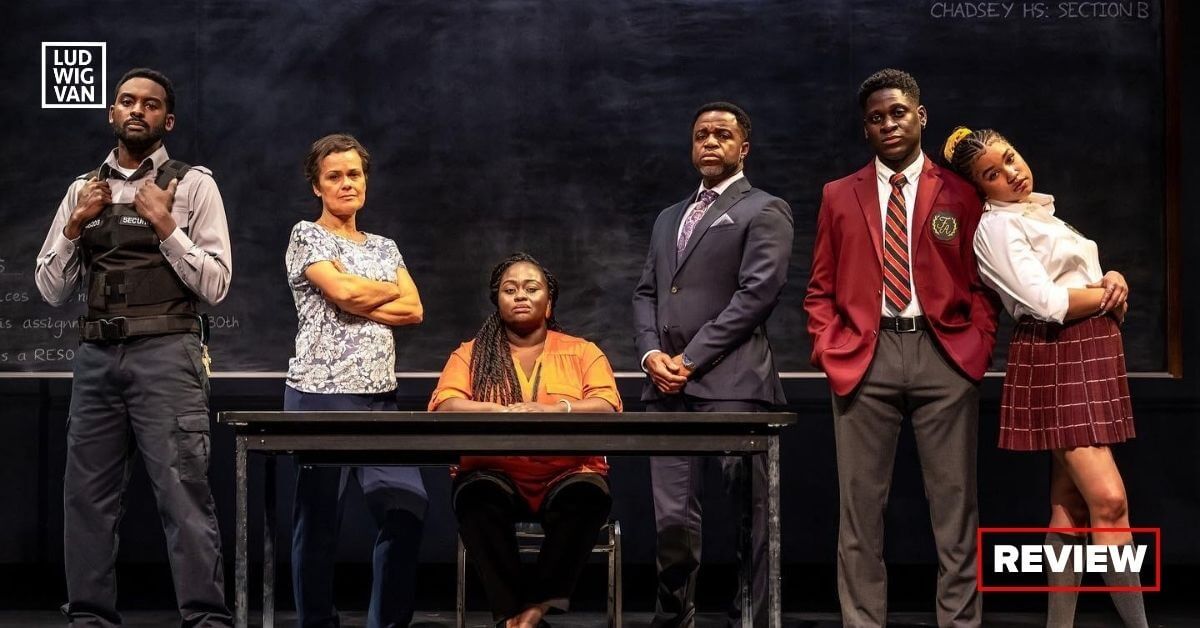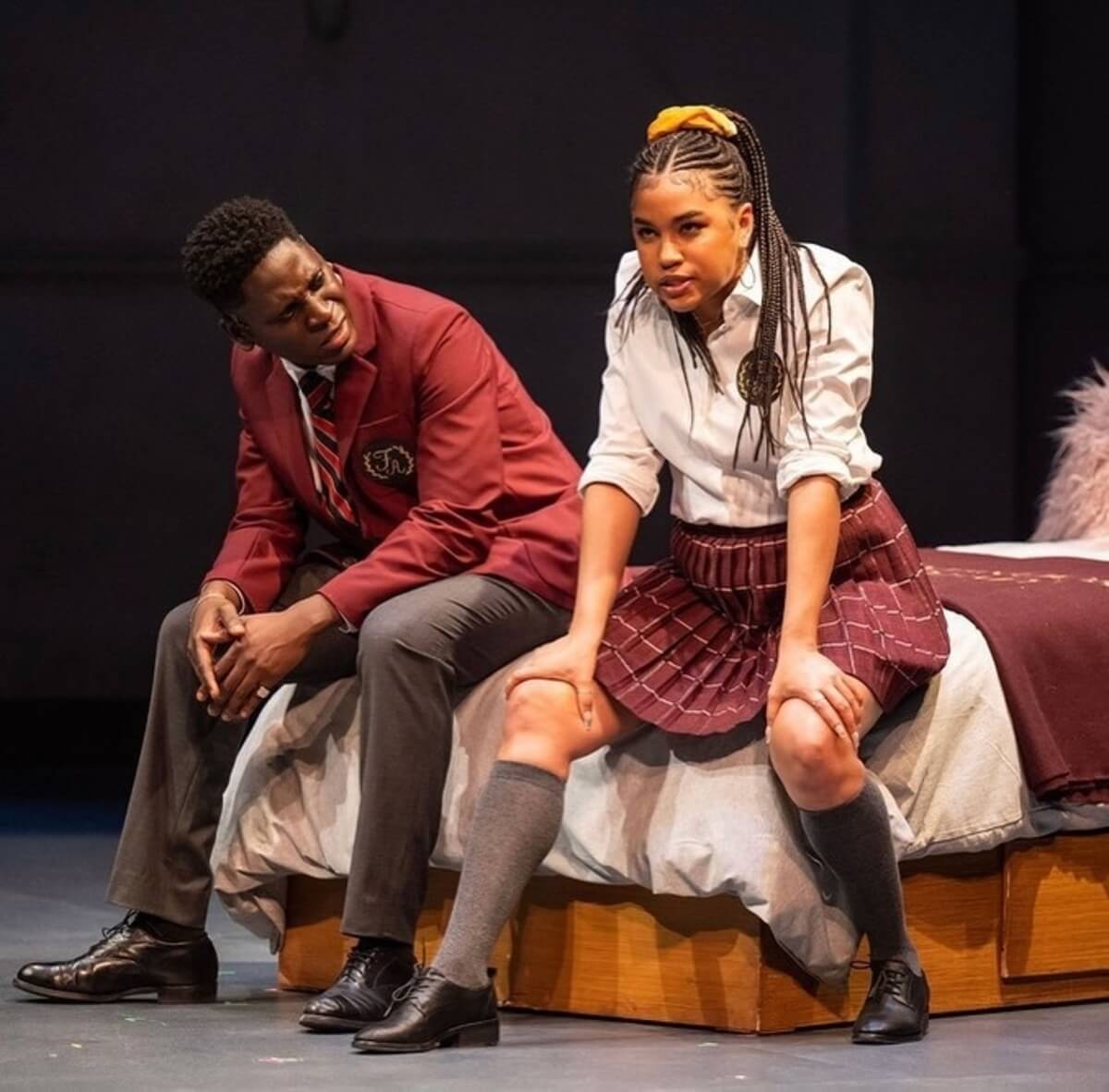
Soulpepper/Pipeline, written by Dominique Morisseau, directed by Weyni Mengesha, Baillie Theatre, Young Centre, Apr. 7 to May 8. Tickets available here.
Soulpepper has opened its doors after two years with another MacArthur “Genius” Grant playwright from the United States. Dominique Morisseau’s Pipeline (2017) takes us into the fevered fears of Afro-American mothers and the embedded rage of Afro-American sons.
The pipeline of the title has a grim meaning. The expected trajectory for the lives of inner-city young Black men is the school-to-prison pipeline. In other words, the rage that causes the public school system to expel them, will inevitably lead them into the criminal justice system. The ultimate end for some of them will be death.
Morisseau’s take on the pipeline is that the root cause is systemic racism. The discipline exercised by schools does not address the issue of rage and a Black youth’s anger when he is disrespected.
Nya (Akosua Amo-Adem) is a divorced Black single mother who teaches English at an inner-city high school. To break the curse of the pipeline, she and her wealthy ex-husband Xavier (Kevin Hanchard) have sent son Omari (Tony Ofori) to a tony upstate New York prep school. Omari, however, is facing police charges for having assaulted a teacher. It’s his third strike.
Other characters include Omari’s girlfriend Jasmine (Chelsea Russell), one of the few Black students at his school. At Nya’s school, there is Dun (Mazin Elsadig), a Black security guard and love interest. His job is to come running when a teacher signals for help. Laurie (Kristen Thomson) is a White fellow teacher who has a very definite view of the public school system. In fact, Laurie has just returned from having plastic surgery for a face slash done to her by a student.
At the heart of the play is Nya’s almost hysterical fear that Omari is going to end up dead. This thought terrorizes her to the point where she has severe anxiety attacks. It is a dark, dark idea that consumes her daily life. Balanced against this is Omari’s story, and his relationship with his mother, father and girlfriend — and of course, his school.
Two classic works of American literature play key roles in the play, and Morisseau has integrated them into the script in very clever ways.
Nya is teaching her class “We Real Cool” (1959), the most famous poem by the late Afro-American writer Gwendolyn Brooks. Subtitled “The Pool Players. Seven at the Golden Shovel.”, the poem ends with the sobering line We die soon.
The other famous work is the late Black American writer Richard Wright’s Native Son (1940). In this harrowing novel, 20-year-old Bigger Thomas, an inner-city Black youth, is failed at every turn in his life, and ends up headed for the electric chair. It is this book that leads to the confrontation between Omari and his teacher.

A lot of the play includes speeches that are more like lectures, as most of the characters expound on their various views of life. Almost everyone has something pithy to say. It is Morisseau’s deliberate choice of writing style for this play. Her motivation behind Pipeline is embedded in these mini-tirades.
The cast is very strong, but beware, the production is in the big Baillie Theatre and sometimes the voices go too low, particularly Amo-Adem and Elsadig. This is a problem that has plagued Soulpepper productions for years, and how many times do I have to say that the director should be monitoring this.
On a positive note, director Weyni Mengesha propels her cast into a fast pace, and Morisseau’s torrent of words is relentless. Nya’s slide into a nervous breakdown is heart-wrenching, just as Omari’s growth in maturity evokes hope. Jasmine and Laurie impress with their declamations, while Dun and Xavier are eclipsed by the women. (Just what is Morisseau saying about adult Black men?) Pipeline’s tight ensemble work makes for compelling theatre.
Mengesha has also pulled out all the stops to make Pipeline a Class A production. Lorenzo Savoini’s revolving stage and black and white, split-screen video projections, the latter capturing school hallways and inner-city streets, make for a dizzying kaleidoscope of images. The cast is submerged in their environment.
Kimberly Purtell’s moody lighting adds darkness to the narrative, while Lyon Smith’s sound design, with its incessant ambient noise, heightens the pressure on the characters, be it the chatter of students, or the noise of the streets. There is a whole world out there that the characters have to live in, in order to survive.
Pipeline is a flawed play because the mini-lectures slow the action down. On the other hand, Morisseau brings up issues that go behind the headlines, and into the heart of a Black family. On balance, this is an important play, and I’m still thinking about it.
#LUDWIGVAN
Get the daily arts news straight to your inbox.
Sign up for the Ludwig van Daily — classical music and opera in five minutes or less HERE.
- INTERVIEW | Actor Diego Matamoros Takes On Icon Walt Disney In Soulpepper Production Of Hnath Play - April 16, 2024
- SCRUTINY | Opera In Concert Shine A Light On Verdi’s Seldom Heard La Battaglia Di Legnano - April 9, 2024
- SCRUTINY | Lepage & Côté’s Hamlet Dazzles With Dance And Stagecraft Without Saying Anything New - April 5, 2024



